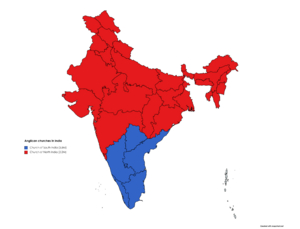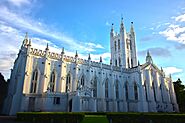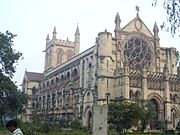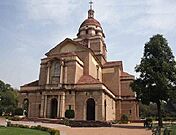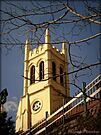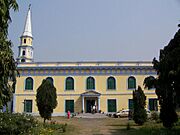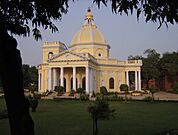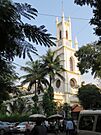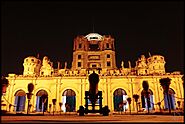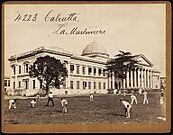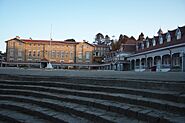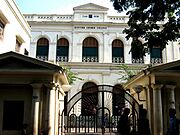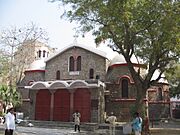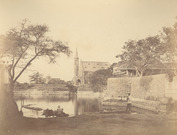Church of North India facts for kids
Quick facts for kids Church of North India |
|
|---|---|
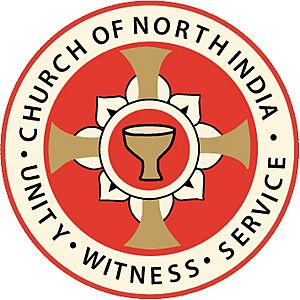
Official seal of the Church of North India
|
|
| Classification | Protestant |
| Orientation | United church |
| Polity | Episcopal |
| Moderator | The Most. Revd. Bijay Kumar Nayak |
| Deputy moderator | The Rt. Revd. Paul B.P. Duphare |
| Distinct fellowships | World Council of Churches, Council for World Mission, Christian Conference of Asia, Communion of Churches in India, National Council of Churches in India |
| Associations |
|
| Region | All of India except Andhra Pradesh, Telangana, Lakshadweep, Karnataka, Kerala and Tamil Nadu |
| Origin | 29 November 1970 Nagpur |
| Merger of |
|
| Separations | United Church of Northern India – Presbyterian Synod |
| Congregations | 3500 congregations in 3000 parishes and 26 dioceses |
| Members | 2,200,000 (Self-declared) |
| Ministers | 2000+ |
| Hospitals | 65 hospitals and nine nursing schools. |
| Secondary schools | 564+ educational institutions and three technical schools. |
The Church of North India (CNI) is the dominant united Protestant church in northern India. It was established on 29 November 1970 by bringing together most of the Protestant churches working in northern India. It is a province of the worldwide Anglican Communion and a member of the World Methodist Council and the World Communion of Reformed Churches. The merger, which had been in discussions since 1929, came eventually between the Church of India, Pakistan, Burma and Ceylon (Anglican), the Methodist Church, Disciples of Christ, and some congregations from the United Church of Northern India (Congregationalist and Presbyterian).
The CNI's jurisdiction covers all states of India with the exception of the five states in the south (Andhra Pradesh, Telangana, Karnataka, Kerala and Tamil Nadu which are under the jurisdiction of the Church of South India) and has approximately 2,200,000 members (0.1% of India's population) in 3,000 pastorates.
Contents
History
Ecumenical discussions with a view to a unified church were initiated by the Australian Churches of Christ Mission, the Methodist Church of Australia, the Wesleyan Methodist Church, the Methodist Episcopal Church and the United Church of Northern India during a religious convention in Lucknow in 1929.
A negotiation committee was set up in 1951 using the plan of Church Union that resulted from the earlier consultations as its basis. The committee was composed of representatives from the Baptist Churches in Northern India; the Church of India, Pakistan, Burma and Ceylon; the Methodist Church (British and Australian conferences); the Methodist Church in Southern Asia; and the United Church of Northern India (UCNI). The Methodist Episcopal Church, however, did not join the discussions and, in 1981, it became the Methodist Church in India (MCI). In 1957, the Church of the Brethren in India and the Disciples of Christ denominations joined in the negotiations as well.
A new negotiation committee was set up in 1961 with representatives from all the above-mentioned denominations. In 1965, a finalized plan of Church Union, known as the 4th Plan of Union 1965, was made. The union was formalized on 29 November 1970 when all the negotiating churches were united as the Church of North India with the exception of the Methodist Church in Southern Asia, which decided not to join the union.
Beliefs and practices
The CNI is a trinitarian church that draws from the traditions and heritage of its constituent denominations. The basic creeds of the CNI are the Apostles' Creed and the Nicene Creed of 381 AD.
Liturgy
The liturgy of the CNI is of particular interest, as it combines many traditions, including that of the Methodists and such smaller churches as the Church of the Brethren and the Disciples of Christ. Provision is given for diverse liturgical practices and understandings of the divine revelation.
Governance
The polity of the CNI brings together the episcopal, the presbyterial and the congregational elements in an effort to reflect the polity of the churches which entered into union. The episcopacy of the CNI is both historical as well as constitutional. There are 26 dioceses, each under the supervision of a bishop. The main administrative and legislative body is the synod, which meets once every three years to elect a presiding bishop, called a moderator, and an executive committee. The moderator acts as the head of the church for a fixed term; another bishop is elected Deputy Moderator.
Social involvement
Social involvement is a major emphasis in the CNI. There are synodal boards in charge of various ministries: Secondary, Higher, Technical and Theological Education, Health Services, Social Services, Rural Development, Literature and Media. There is also a synodal Programme Office which seeks to protect and promote peace, justice, harmony and dignity of life.
The CNI currently operates 65 hospitals, nine nursing schools, 250 educational institutions and three technical schools. Some of the oldest and well-respected educational institutions in India like Scottish Church College in Calcutta, La Martiniere Calcutta, Wilson College in Mumbai, St. James' School, Calcutta, Hislop College in Nagpur, St. John's Diocesan Girls' School, Calcutta, St. Paul's School in Darjeeling, St. John's College in Agra and College Bishop Cotton School in Shimla, Christ Church College, Kanpur, Sherwood College, Nainital, Ewing Christian College, Prayagraj, Boys High School, St. Andrew's College in Gorakhpur are under the administration of the CNI.
Ecumenism
The CNI participates in many ecumenical bodies as a reflection of its commitment towards church unity. Domestically it participates in a joint council with the Church of South India and the Mar Thoma Syrian Church known as the Communion of Churches in India. It is also a member of the National Council of Churches in India. Regionally, the CNI participates in the Christian Conference of Asia and on an international level it is a member of the World Council of Churches, the Council for World Mission, World Alliance of Reformed Churches, World Methodist Council and in full communion with the Anglican Communion. The CNI is also in partnership with many other domestic, regional and international Christian agencies.
Gallery
Present administrators
- Moderator: The Most. Revd. Bijay K. Nayak, Bishop, Diocese of Agra
- Deputy Moderator: The Rt. Revd. Paul B.P. Dupare, Bishop, Diocese of Nagpur
- Treasurer: Mr.Subrata Gorai
- General Secretary: The Revd. Dr. D.J. Ajith Kumar
Moderators
Since its formation in 1970, the Synod of the CNI has elected a Moderator and one Deputy every three years.
| Term | Moderator | Deputy Moderator |
|---|---|---|
| April 1971 – July 1974 | Eric Nasir, Bishop in Delhi (and Rajasthan) |
Ramchandra Bhandare, Bishop in Nagpur |
| July 1974 – October 1977 | ||
| October 1977 – October 1980 | ||
| October 1980 – November 1983 | Ramchandra Bhandare, Bishop in Nagpur |
Dinesh Chandra Gorai, Bishop in Calcutta |
| November 1983 – October 1986 | Dinesh Chandra Gorai, Bishop in Calcutta |
Din Dayal, Bishop in Lucknow |
| October 1986 – October 1989 | Din Dayal, Bishop in Lucknow |
John Ghosh, Bishop in Darjeeling |
| October 1989 – October 1992 | John Ghosh, Bishop in Darjeeling |
Franklin Jonathan, Bishop in Jabalpur |
| October 1992 – October 1995 | Anand Chandu Lal, Bishop in Amritsar |
Dhirendra Mohanty, Bishop in Cuttack |
| October 1995 – October 1998 | Dhirendra Mohanty, Bishop in Cuttack |
Vinod Peter, Bishop in Nagpur |
| October 1998 – January 2001 | Vinod Peter, Bishop in Nagpur (died December 2000) |
James Terom, Bishop in Chotanagpur |
| January – October 2001 | James Terom, Bishop in Chotanagpur |
Brojen Malakar, Bishop in Barrackpore |
| October 2001 – October 2004 | James Terom, Bishop in Chotanagpur |
Joel Mal, Bishop in Chandigarh |
| October 2004 – October 2005 | ||
| October 2005 – October 2008 | Joel Mal, Bishop in Chandigarh |
Purely Lyngdoh, Bishop in North East India |
| October 2008 – October 2011 | Purely Lyngdoh, Bishop in North East India |
Philip Marandih, Bishop in Patna |
| October 2011 – October 2014 | Philip Marandih, Bishop in Patna |
Pradeep Samantaroy, Bishop in Amritsar |
| October 2014 – 3 October 2017 | Pradeep Samantaroy, Bishop in Amritsar |
Prem Singh, Bishop in Jabalpur |
| October 2017 – 23 August 2019 | Prem Singh, Bishop in Jabalpur |
Probal Dutta, Bishop in Durgapur and Kolkata |
| 23 August 2019 – 14 September 2022 | Bijay Kumar Nayak, Bishop in Phulbani |
|
| 09 December 2022 – present | Bijay Kumar Nayak | Paul B.P. Duphare |
Dioceses
Diocese of Calcutta
When originally founded in 1813, the fourth overseas diocese of the Church of England covered all the subcontinent, all Australasia and some of Africa. With its 1835 split to create Madras diocese, Calcutta was made metropolitan over all its original area, and has been split many times since. The Bishop of Calcutta remained Metropolitan of India until the CNI's 1970 creation; the current diocese covers parts of Bengal and the bishop is Paritosh Canning.
Diocese of Mumbai
Split from Calcutta diocese in 1837, the Diocese of Bombay was the last new Indian diocese of the Church of England before all colonial dioceses became independent in 1863. Like Calcutta, Mumbai diocese has been a very large Church of England diocese, a diocese of the independent Indian Anglican church, and now a United Church diocese. The CNI diocese today covers Maharashtra, and the bishop is Prakash D. Patole.
Diocese of Chotanagpur
Founded from Calcutta diocese in 1890, the current diocese is based in Ranchi, its territory is Jharkhand and the bishop is B. B. Baskey.
Diocese of Lucknow
Erected in 1893 from the Diocese of Calcutta. The diocese is headquartered at Allahabad and serves Uttar Pradesh.
Diocese of Nagpur
The diocese was originally created in 1902/03, from Chotanagpur diocese.
Diocese of North East India
The CNI Northeast diocese, based in Shillong, North East India is headed by bishop Michael Herenz. It originated as the Diocese of Assam, in the Anglican Church of India, erected from Calcutta in 1915; and became known by the present name before 1986.
Diocese of Nasik
In 1929, Nasik diocese was founded from Bombay; her present bishop is Sharad Gaikwad.
List of Dioceses
| Name | Founded | Headquarters | Location | Bishop | Website |
|---|---|---|---|---|---|
| Diocese of Delhi | 1947, from Lahore | New Delhi | Delhi, Haryana | Paul Swarup | https://www.dioceseofdelhi.org/ |
| Diocese of Dooars | 2023 in Delhi | West Bengal & Assam | Santalpur, Mission Compound | The Rt. Revd. B.B Baksey (Moderator's Episcopal Commissary) | |
| Diocese of Amritsar | 1953, from Lahore | Amritsar | Punjab, Himachal Pradesh, Jammu and Kashmir | P. K. Samantaroy | www.amritsardiocesecni.org |
| Diocese of Barrackpore | 1956, from Calcutta | Barrackpore | West Bengal | Rt. Rev Subrata Chakraborty | |
| Diocese of Andaman and Nicobar | 1966, from Calcutta | Port Blair | Andaman and Nicobar Islands | Christopher Paul | |
| Diocese of Jabalpur | 1970, from Nagpur | Jabalpur | Madhya Pradesh | Vacant | http://dioceseofjabalpur-cni.org/ |
| Diocese of Patna | bef. 70 | Bhagalpur | Bihar and Jharkhand | Philip P. Marandih | |
| Diocese of Cuttack | 1970 | Cuttack | Cuttack, Odisha | Surendra Kumar Nanda | http://www.dioceseofcuttackcni.in/ |
| Diocese of Bhopal | betw. 70-79, from Jabalpur | Indore | Madhya Pradesh | Manoj Charan | |
| Diocese of Rajasthan | 1981, from Delhi | Ajmer | Rajasthan | The Rt. Revd. Manoj Charan (Moderator's Episcopal Commissary) | |
| Diocese of Gujarat | betw. 70-96 | Ahmedabad | Gujarat | Silvans Christian | |
| Diocese of Kolhapur | betw. 70-96 | Kolhapur | Maharashtra | Sandeep Suresh Vibhute | |
| Diocese of Durgapur | betw. 70-96 | Durgapur | West Bengal | Sameer Issac Khimla | |
| Diocese of Chandigarh | 1974, from Amritsar | Ludhiana | Chandigarh, Punjab | Denzel Peoples | |
| Diocese of Agra | 1976, from Lucknow | Agra | Uttar Pradesh, Uttarakhand | Bijay Kumar Nayak | http://cnidioceseofagra.org |
| Diocese of Eastern Himalaya | bef. 1987 — Darjeeling, renamed c. 1992, from Barrackpur | Darjeeling | West Bengal, Bhutan, parts of Assam | vacant Acting: Michael Herenz |
|
| Diocese of Sambalpur | bef 96 | Bolangir | Odisha | Pinuel Dip | |
| Diocese of Phulbani | 1997, from Cuttack | Kandhmal | Odisha | Vacant | |
| Diocese of Marathwada | c. 2000 | Aurangabad | Maharashtra | M. U. Kasab | |
| Diocese of Pune | c. 2000 | Pune | Maharashtra | Andrew Rathod | |
| Diocese of Chhattisgarh | 2010, from Jabalpur | Raipur | Chhattisgarh | Ajay Umesh James |
See also
- Anglican Communion
- Christianity in West Bengal
- Christian Conference of Asia
- Christianity in India
- Church of South India
- Malankara Mar Thoma Syrian Church
- Church of Pakistan


